
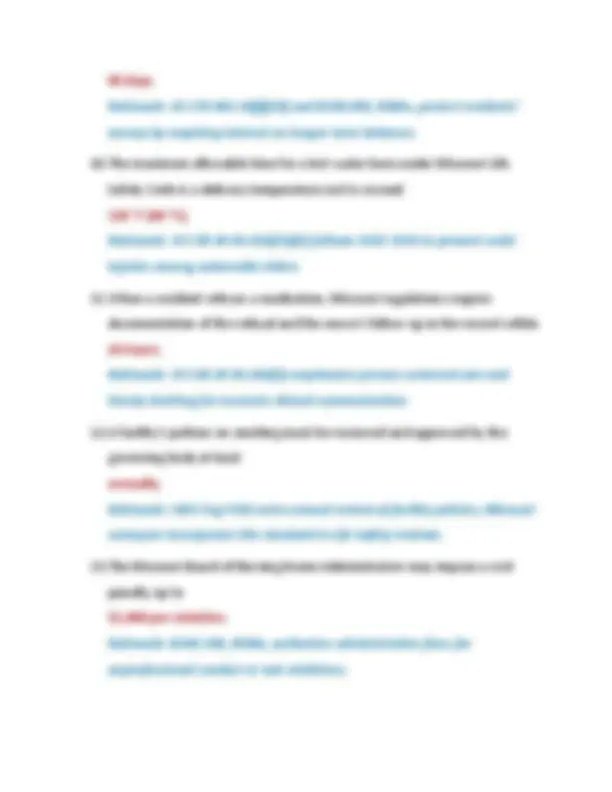
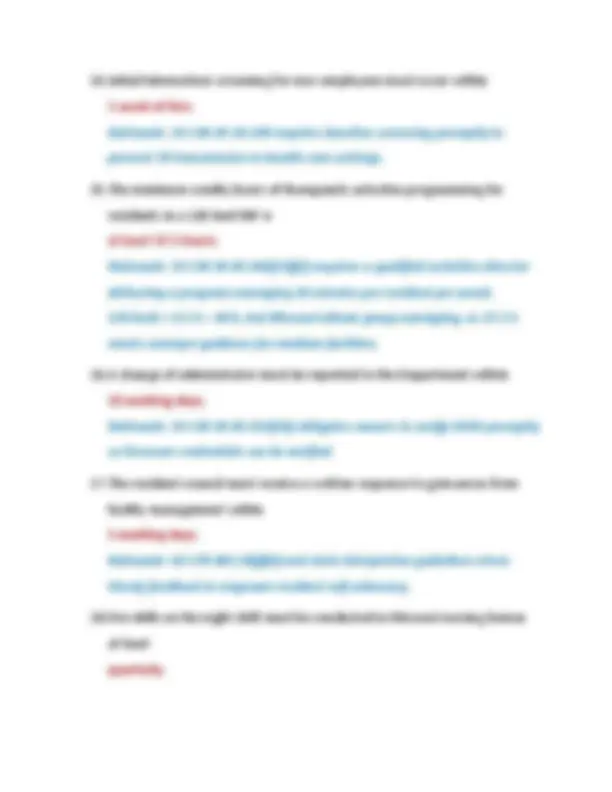
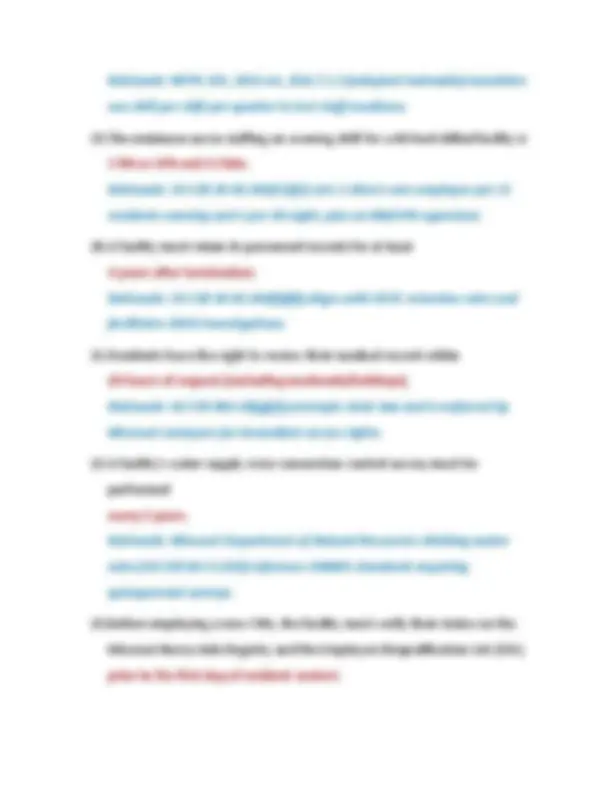
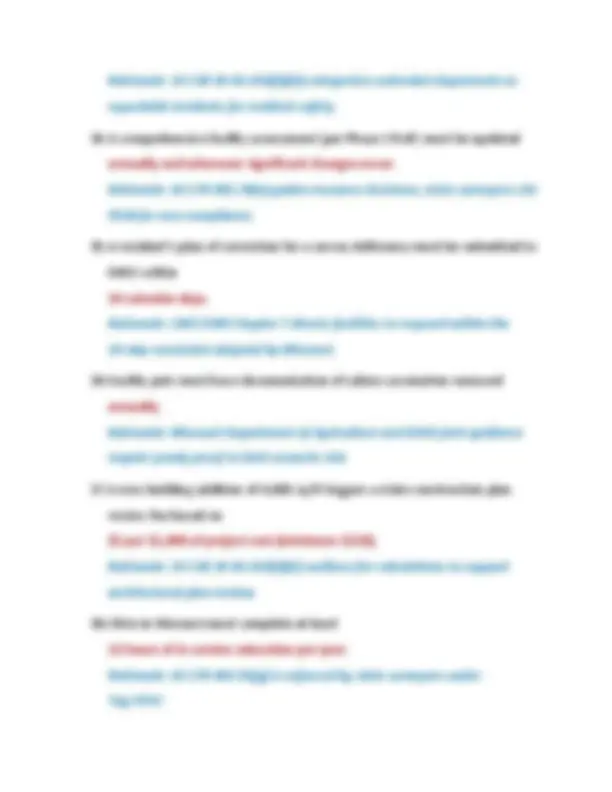
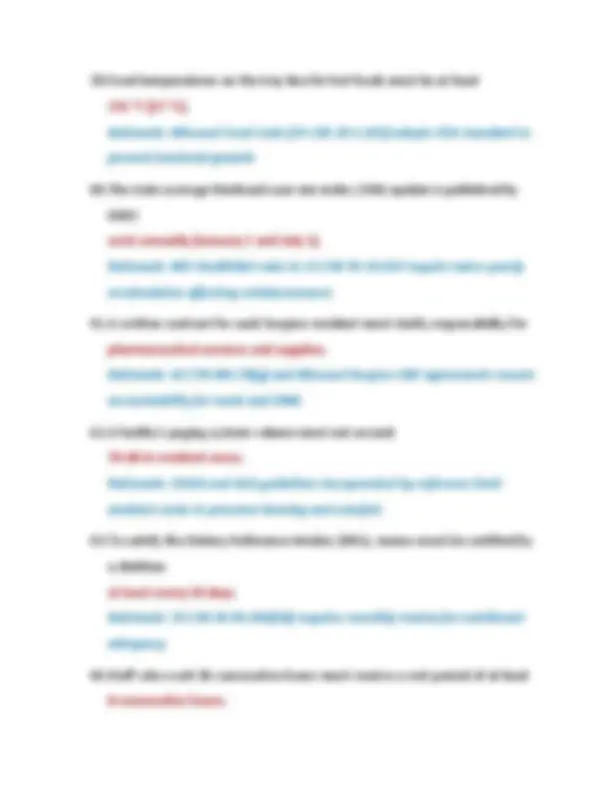
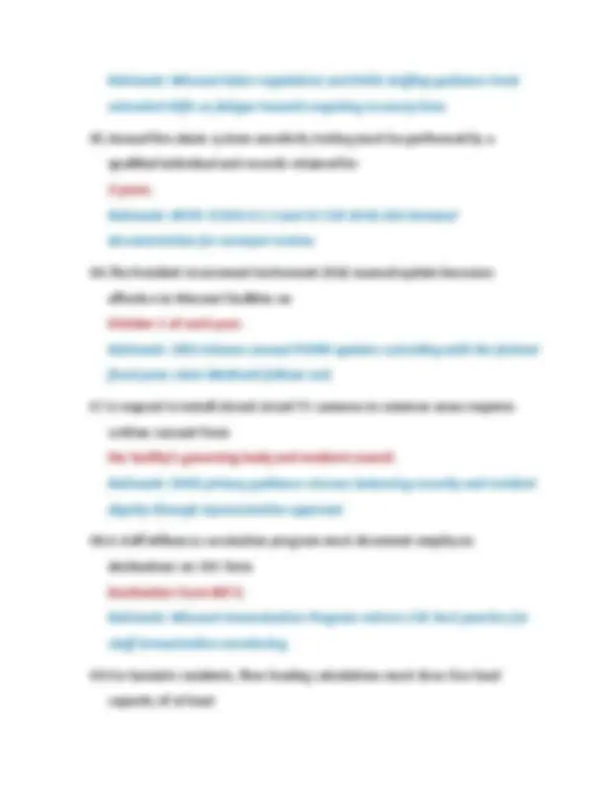
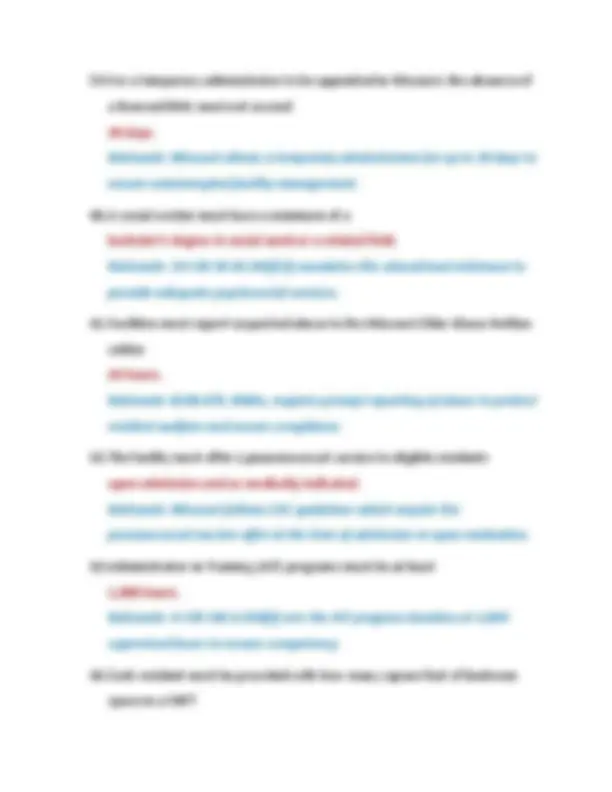
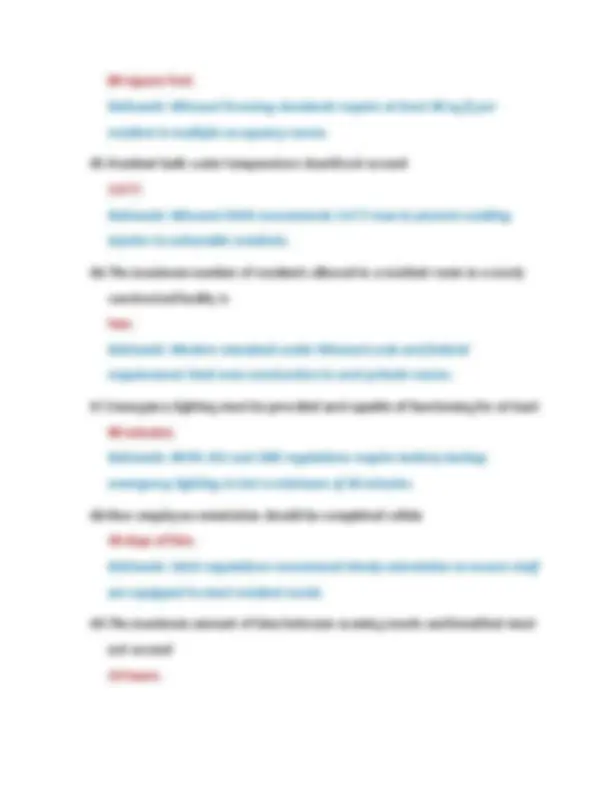
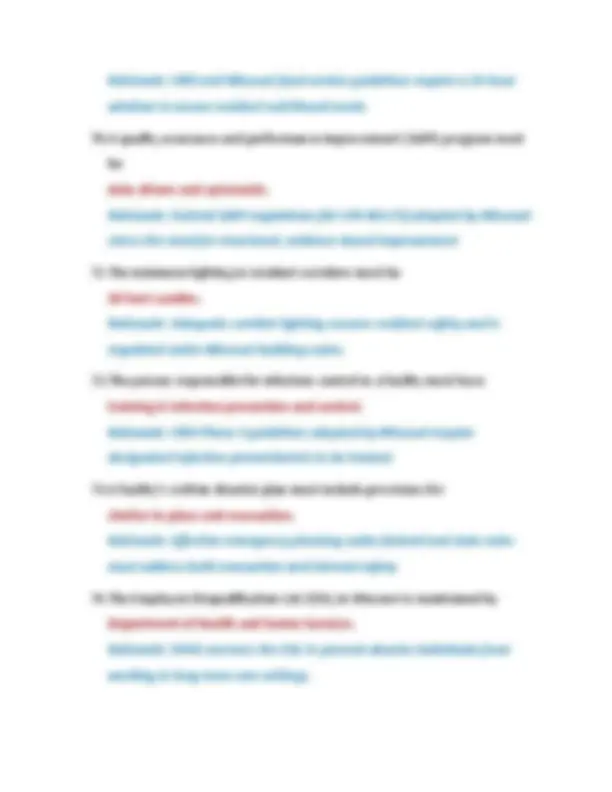
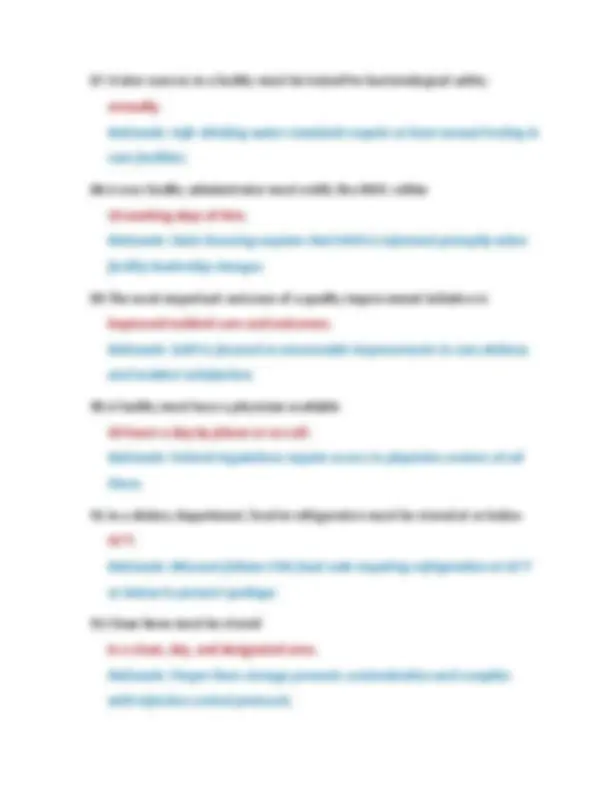
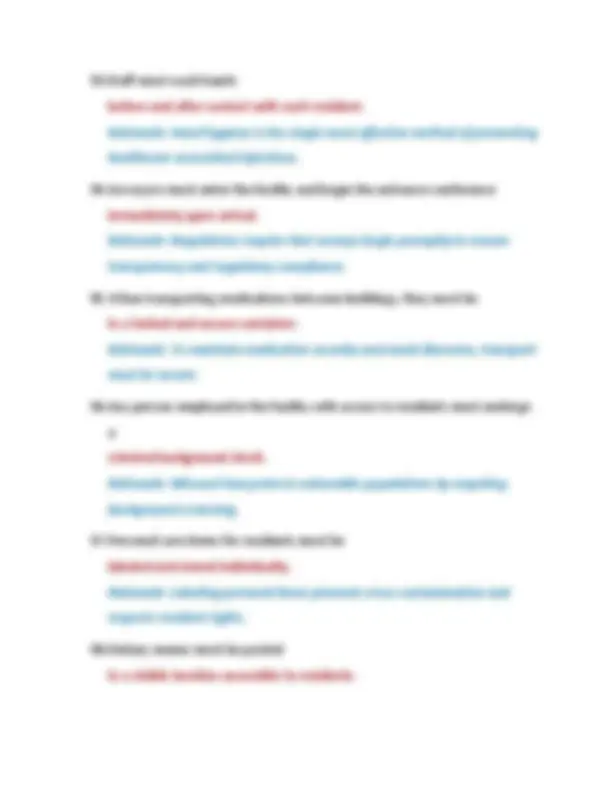
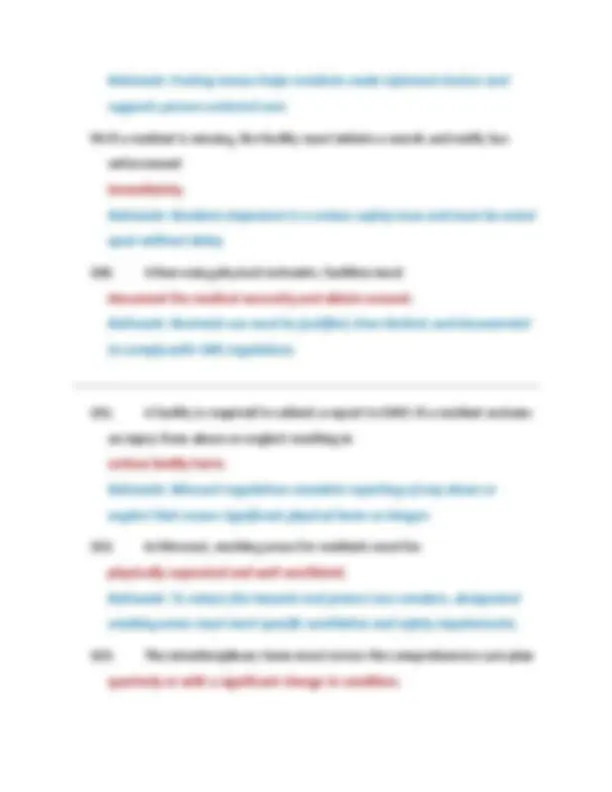
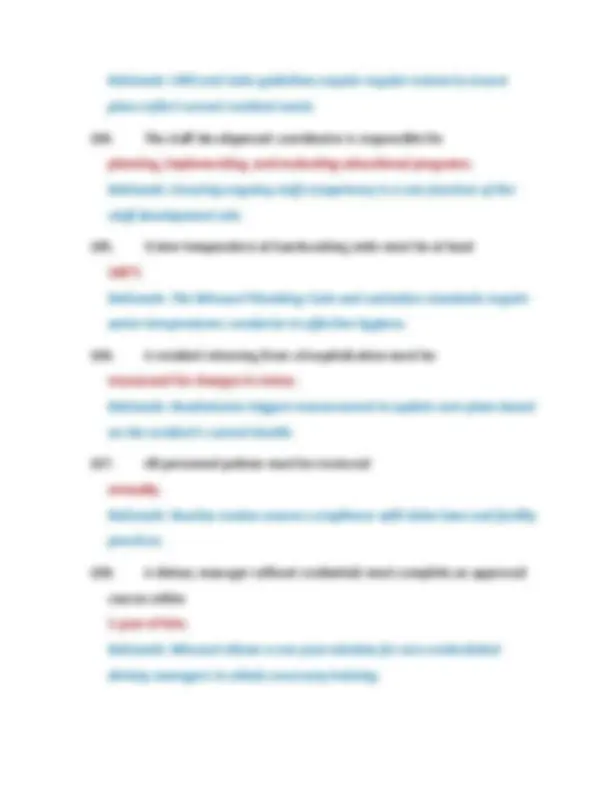
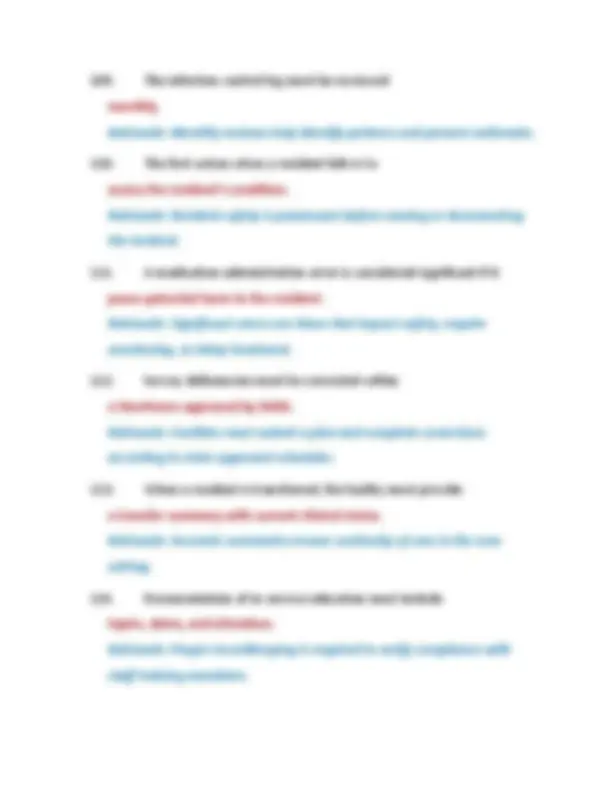
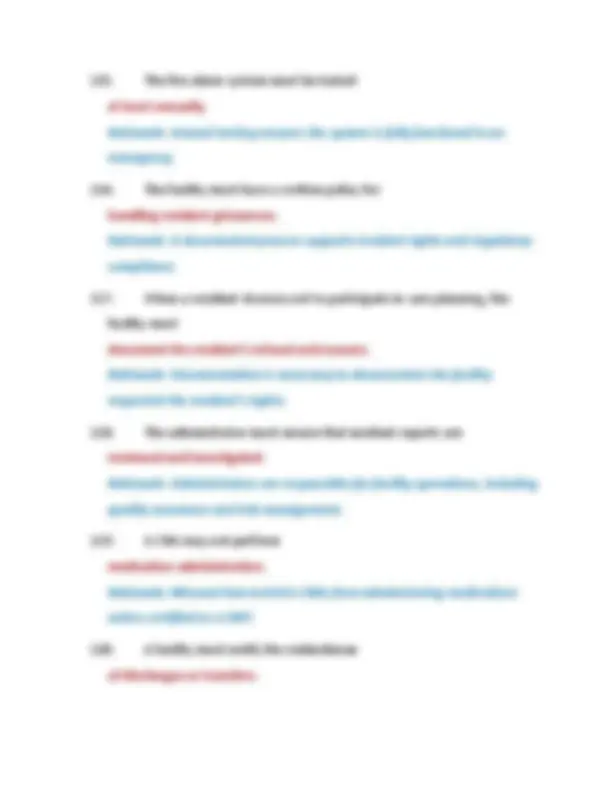
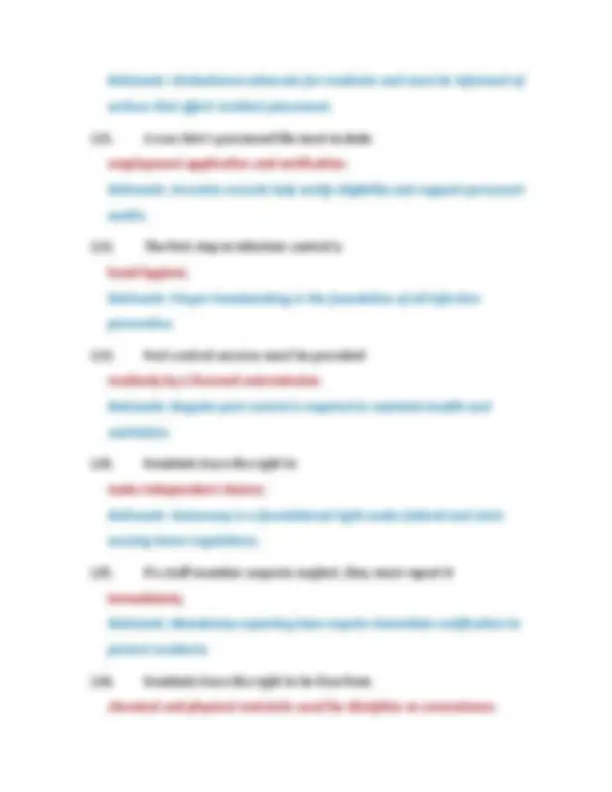
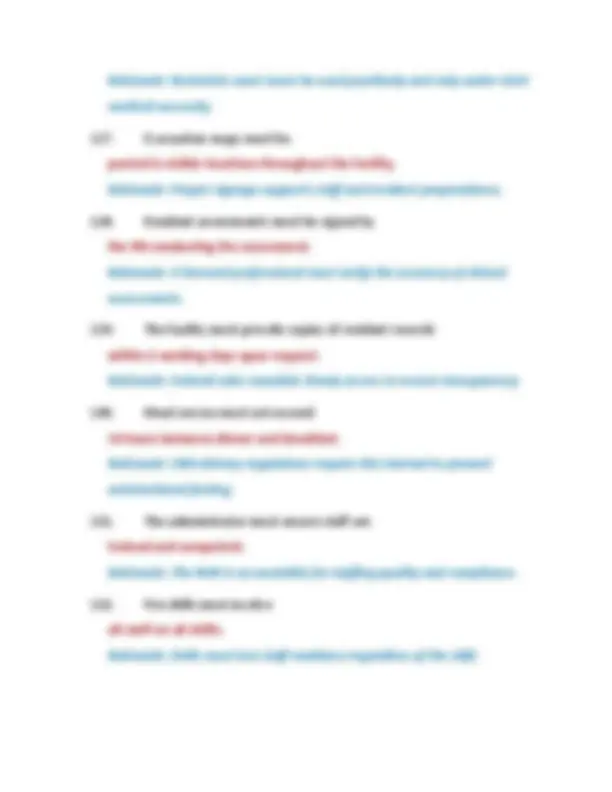
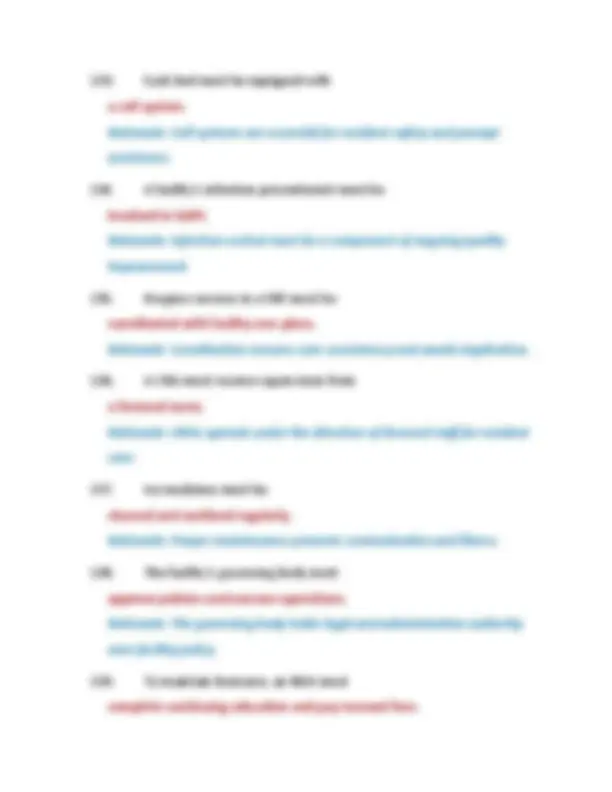
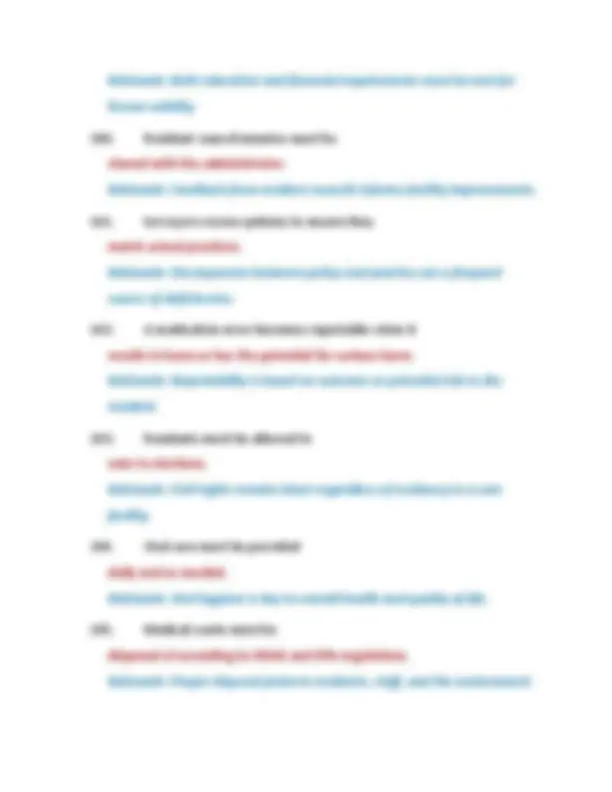
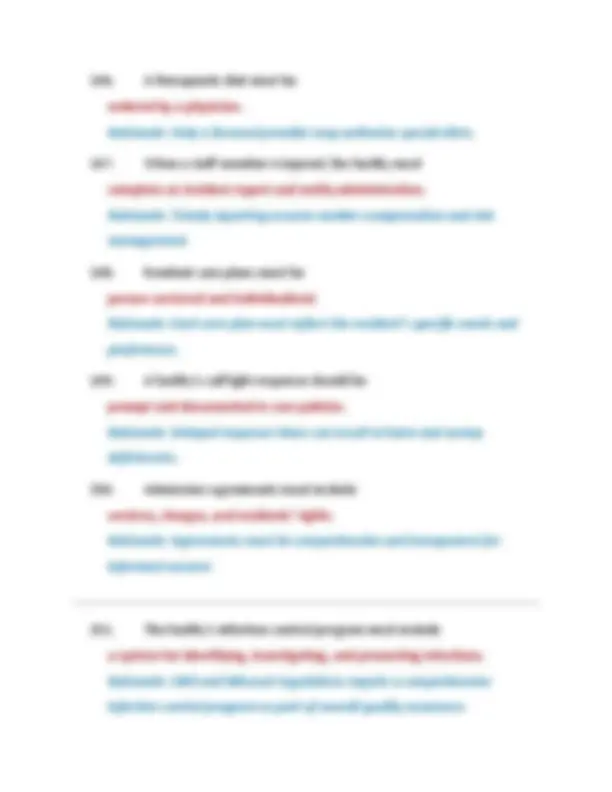
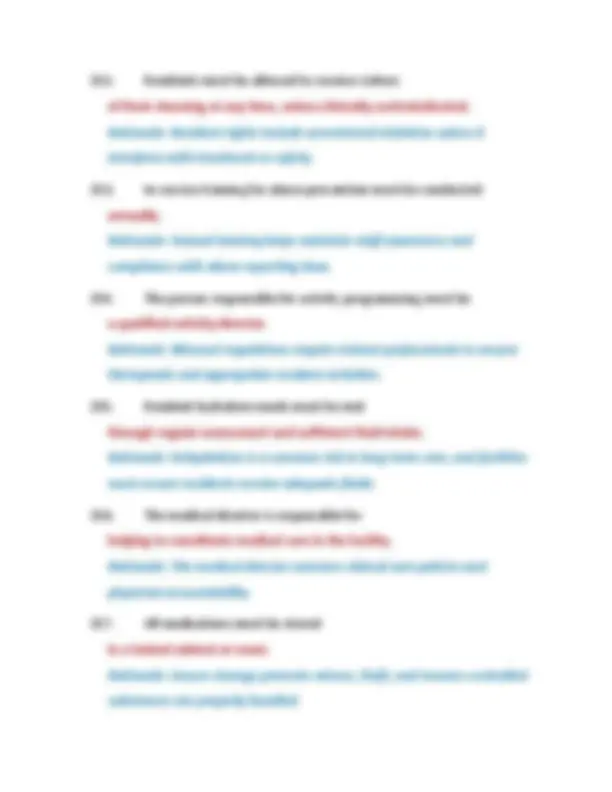
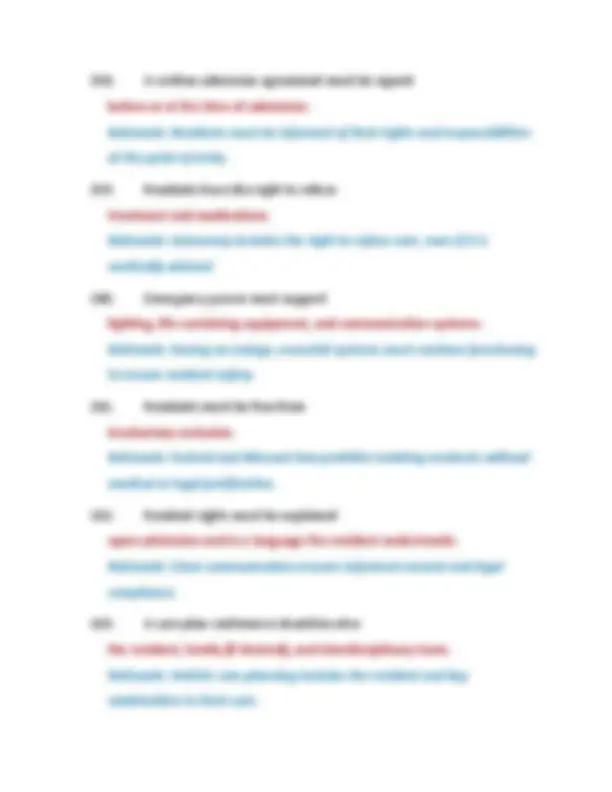
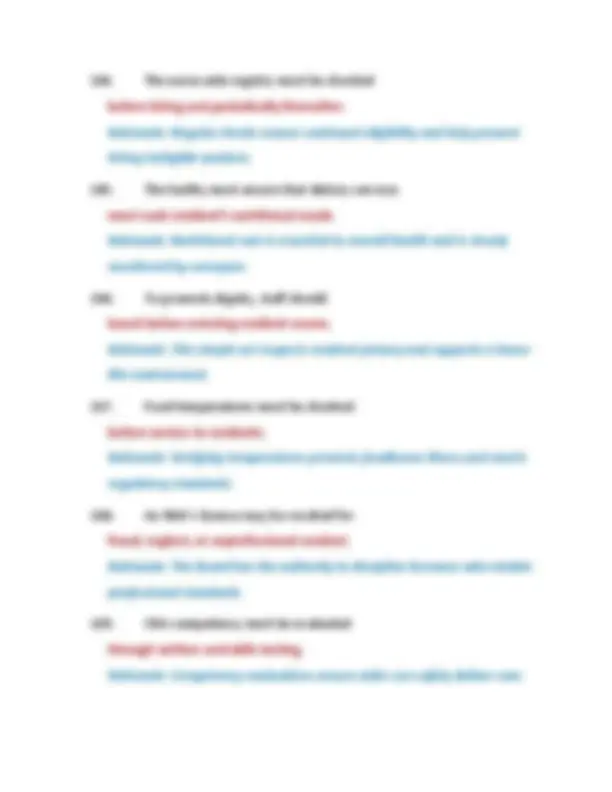
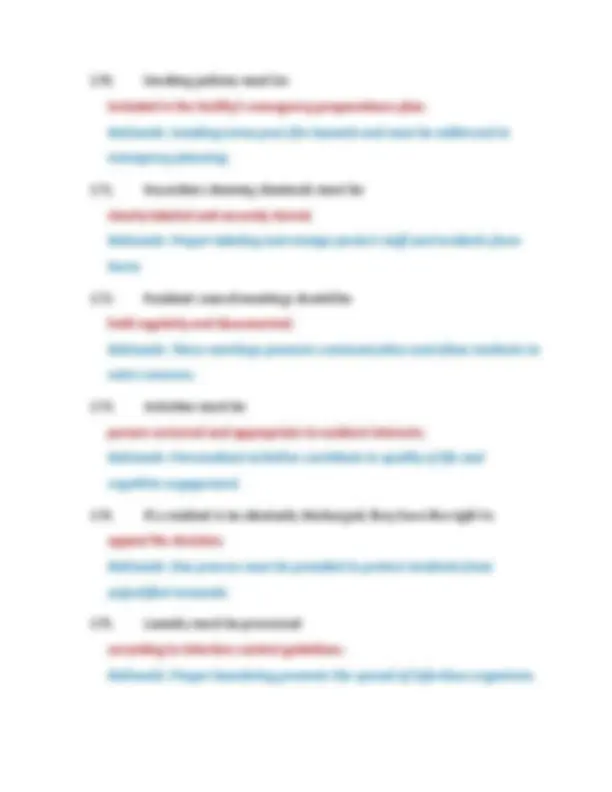
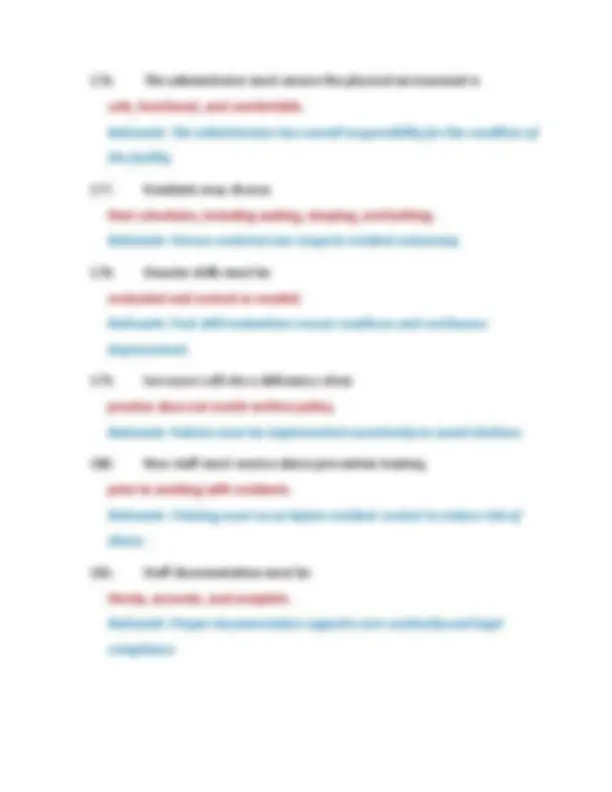
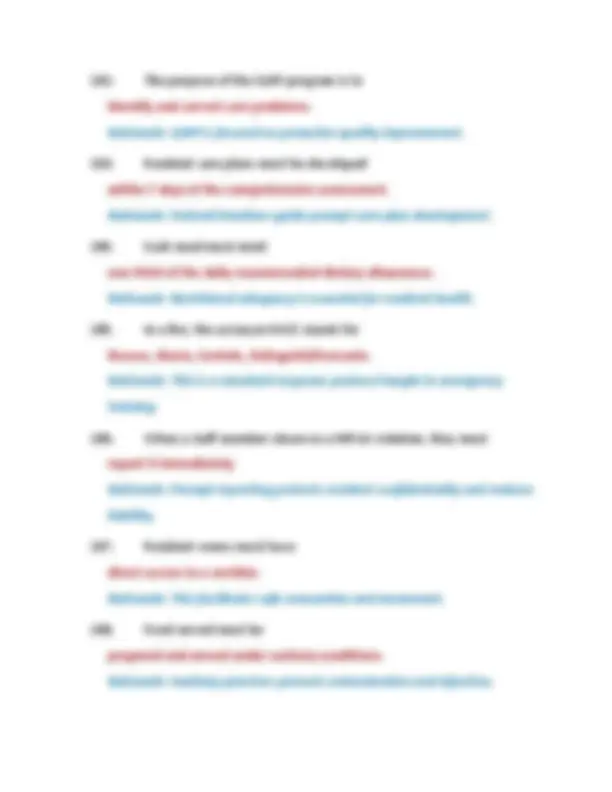
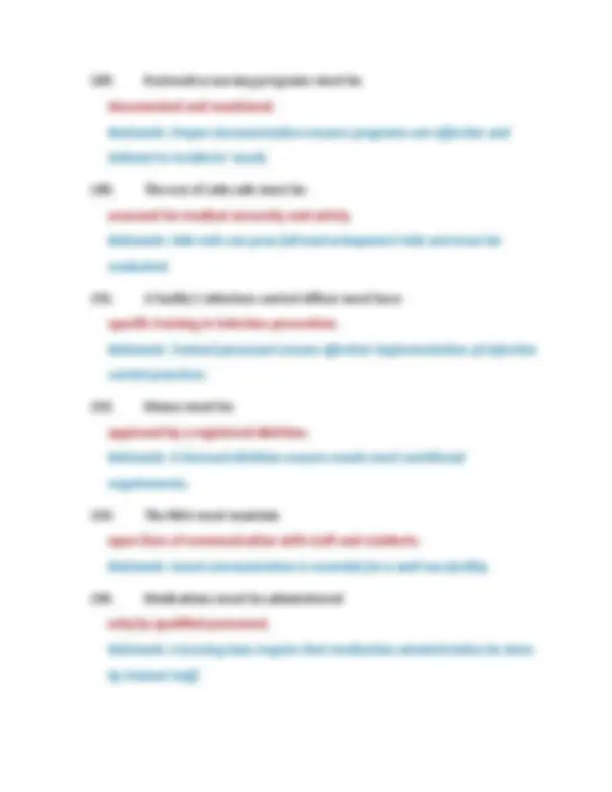
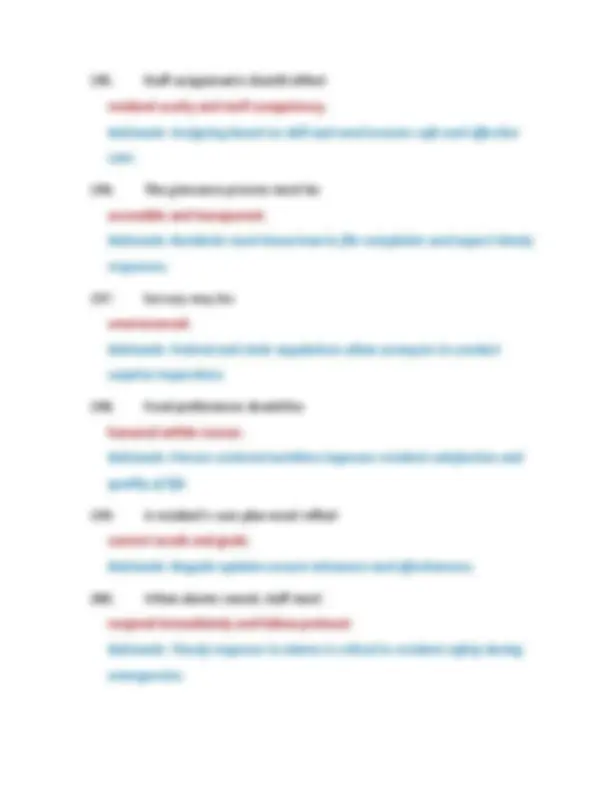


Study with the several resources on Docsity

Earn points by helping other students or get them with a premium plan


Prepare for your exams
Study with the several resources on Docsity

Earn points to download
Earn points by helping other students or get them with a premium plan
Community
Ask the community for help and clear up your study doubts
Discover the best universities in your country according to Docsity users
Free resources
Download our free guides on studying techniques, anxiety management strategies, and thesis advice from Docsity tutors
Missouri – MO Dept. of Health and Senior Services, Board of Nursing Home Administrators Questions And Correct Answers (Verified Answers) Plus Rationales 2025 Q&A | Instant Download
Typology: Exams
1 / 36

This page cannot be seen from the preview
Don't miss anything!





























intentionally inflicted. Rationale: §198.006(1), RSMo, distinguishes intentional acts (abuse) from negligent acts (neglect), guiding reporting duties.
14.Initial tuberculosis screening for new employees must occur within 1 week of hire. Rationale: 19 CSR 20 - 20.100 requires baseline screening promptly to prevent TB transmission in health-care settings. 15.The minimum weekly hours of therapeutic activities programming for residents in a 120-bed SNF is at least 37.5 hours. Rationale: 19 CSR 30 - 85.042(13)(E) requires a qualified activities director delivering a program averaging 30 minutes per resident per week; 120 beds × 0.5 h = 60 h, but Missouri allows group averaging, so 37.5 h meets surveyor guidance for medium facilities. 16.A change of administrator must be reported to the Department within 10 working days. Rationale: 19 CSR 30 - 85.012(16) obligates owners to notify DHSS promptly so licensure credentials can be verified. 17.The resident council must receive a written response to grievances from facility management within 5 working days. Rationale: 42 CFR 483.10(f)(5) and state interpretive guidelines stress timely feedback to empower resident self-advocacy. 18.Fire drills on the night shift must be conducted in Missouri nursing homes at least quarterly.
Rationale: NFPA 101, 2012 ed., §18.7.1.2 (adopted statewide) mandates one drill per shift per quarter to test staff readiness. 19.The minimum nurse staffing on evening shift for a 60-bed skilled facility is 1 RN or LPN and 2 CNAs. Rationale: 19 CSR 30 - 85.042(11)(C) sets 1 direct-care employee per 15 residents evening and 1 per 20 night, plus an RN/LPN supervisor. 20.A facility must retain its personnel records for at least 3 years after termination. Rationale: 19 CSR 30 - 85.042(6)(B) aligns with EEOC retention rules and facilitates DHSS investigations. 21.Residents have the right to review their medical record within 24 hours of request (excluding weekends/holidays). Rationale: 42 CFR 483.10(g)(2) preempts state law and is enforced by Missouri surveyors for immediate access rights. 22.A facility’s water supply cross-connection control survey must be performed every 5 years. Rationale: Missouri Department of Natural Resources drinking-water rules (10 CSR 60 - 11.010) reference AWWA standards requiring quinquennial surveys. 23.Before employing a new CNA, the facility must verify their status on the Missouri Nurse Aide Registry and the Employee Disqualification List (EDL) prior to the first day of resident contact.
Rationale: 19 CSR 30 - 85.042(14)(C) tightens the federal 72-hour limit, underscoring medication safety. 29.For physical restraints, a facility must obtain a written, time-limited order not to exceed 24 hours. Rationale: 42 CFR 483.12(a)(2) and Missouri Abuse Prevention Act restrict duration to protect resident autonomy. 30.The annual life-safety inspection tag (LTC Form 2836) must be posted in a conspicuous public area for 60 days. Rationale: 19 CSR 30 - 85.022(3)(E) promotes transparency of compliance status to families and residents. 31.The minimum fire-resistance rating for corridor doors in new SNF construction under Missouri’s adopted NFPA 101 (2012) is 20 minutes. Rationale: Table 18.3.6.2 lists 20-minute doors to limit smoke and heat spread during evacuation. 32.An involuntary discharge notice must be provided to the resident and ombudsman at least 30 days in advance. Rationale: 42 CFR 483.15(c) applies unless emergency endangerment exists; Missouri long-term-care rules mirror this timeline. 33.The facility must report any resident elopement that lasts more than 30 minutes to the DHSS Hotline within 24 hours.
Rationale: 19 CSR 30 - 85.010(2)(A) categorizes extended elopements as reportable incidents for resident safety. 34.A comprehensive facility assessment (per Phase 2 RoP) must be updated annually and whenever significant changes occur. Rationale: 42 CFR 483.70(e) guides resource decisions; state surveyors cite F838 for non-compliance. 35.A resident’s plan of correction for a survey deficiency must be submitted to DHSS within 10 calendar days. Rationale: CMS SOM Chapter 7 directs facilities to respond within the 10 - day constraint adopted by Missouri. 36.Facility pets must have documentation of rabies vaccination renewed annually. Rationale: Missouri Department of Agriculture and DHSS joint guidance require yearly proof to limit zoonotic risk. 37.A new building addition of 4,000 sq ft triggers a state construction plan review fee based on $5 per $1,000 of project cost (minimum $150). Rationale: 19 CSR 30 - 85.022(2)(C) outlines fee calculations to support architectural plan review. 38.CNAs in Missouri must complete at least 12 hours of in-service education per year. Rationale: 42 CFR 483.95(g) is enforced by state surveyors under Tag F947.
Rationale: Missouri labor regulations and DHSS staffing guidance treat extended shifts as fatigue hazards requiring recovery time. 45.Annual fire-alarm system sensitivity testing must be performed by a qualified individual and records retained for 3 years. Rationale: NFPA 72 §14.4.5.3 and 19 CSR 30 - 85.022 demand documentation for surveyor review. 46.The Resident Assessment Instrument (RAI) manual update becomes effective in Missouri facilities on October 1 of each year. Rationale: CMS releases annual PDPM updates coinciding with the federal fiscal year; state Medicaid follows suit. 47.A request to install closed-circuit TV cameras in common areas requires written consent from the facility’s governing body and resident council. Rationale: DHSS privacy guidance stresses balancing security and resident dignity through representative approval. 48.A staff influenza vaccination program must document employee declinations on CDC form Declination Form 907 E. Rationale: Missouri Immunization Program mirrors CDC best practice for staff immunization monitoring. 49.For bariatric residents, floor loading calculations must show live-load capacity of at least
100 lb/sq ft. Rationale: International Building Code (IBC) 2018, adopted by Missouri, raises live-load requirements for specialized care areas. 50.The administrator must verify that all volunteers have completed orientation covering abuse prevention and resident rights before any unsupervised resident contact. Rationale: 42 CFR 483.95(c) and 19 CSR 30 - 85.042(17) extend training mandates to volunteers to safeguard residents. 51.The Missouri Board of Nursing Home Administrators requires licensees to renew their license biennially (every 2 years). Rationale: Per 4 CSR 140-1.050, Missouri administrators must renew licenses every two years with required continuing education. 52.The minimum passing score for the Missouri state NHA exam is 75%. Rationale: The Board sets a 75% passing threshold to ensure a basic competency level for licensed administrators. 53.An administrator must complete how many hours of continuing education per renewal cycle? 40 hours. Rationale: 4 CSR 140-6.010(11) requires 40 CE hours every two years for license renewal.
59.For a temporary administrator to be appointed in Missouri, the absence of a licensed NHA must not exceed 30 days. Rationale: Missouri allows a temporary administrator for up to 30 days to ensure uninterrupted facility management. 60.A social worker must have a minimum of a bachelor’s degree in social work or a related field. Rationale: 19 CSR 30-85.042(12) mandates this educational minimum to provide adequate psychosocial services. 61.Facilities must report suspected abuse to the Missouri Elder Abuse Hotline within 24 hours. Rationale: §198.070, RSMo, requires prompt reporting of abuse to protect resident welfare and ensure compliance. 62.The facility must offer a pneumococcal vaccine to eligible residents upon admission and as medically indicated. Rationale: Missouri follows CDC guidelines which require the pneumococcal vaccine offer at the time of admission or upon evaluation. 63.Administrator-in-Training (AIT) programs must be at least 1,000 hours. Rationale: 4 CSR 140-6.010(2) sets the AIT program duration at 1, supervised hours to ensure competency. 64.Each resident must be provided with how many square feet of bedroom space in a SNF?
80 square feet. Rationale: Missouri licensing standards require at least 80 sq ft per resident in multiple-occupancy rooms. 65.Resident bath water temperature should not exceed 115°F. Rationale: Missouri DHSS recommends 115°F max to prevent scalding injuries to vulnerable residents. 66.The maximum number of residents allowed in a resident room in a newly constructed facility is two. Rationale: Modern standards under Missouri code and federal requirements limit new construction to semi-private rooms. 67.Emergency lighting must be provided and capable of functioning for at least 90 minutes. Rationale: NFPA 101 and CMS regulations require battery backup emergency lighting to last a minimum of 90 minutes. 68.New employee orientation should be completed within 30 days of hire. Rationale: State regulations recommend timely orientation to ensure staff are equipped to meet resident needs. 69.The maximum amount of time between evening snacks and breakfast must not exceed 14 hours.
75.For residents on warfarin, INR levels must be monitored according to physician orders and facility policy. Rationale: Monitoring varies by individual need but must follow MD orders to prevent adverse events. 76.Pressure ulcer prevention is best achieved through frequent repositioning and skin assessments. Rationale: Evidence-based practice shows prevention through mobility and routine skin checks is most effective. 77.Oxygen tanks must be stored upright and secured in a ventilated area. Rationale: OSHA and NFPA standards require safe oxygen storage to reduce explosion and fire hazards. 78.The administrator is responsible for ensuring that care is provided in accordance with the care plan. Rationale: The NHA is legally accountable for overseeing implementation of interdisciplinary care plans. 79.A facility may discharge a resident for non-payment after 30 days' written notice. Rationale: CMS and Missouri discharge policies require written notice at least 30 days in advance of financial discharge. 80.The most critical document in a surveyor’s review of a facility is the plan of correction. Rationale: Surveyors use this document to verify that deficiencies are acknowledged and corrected.
81.Each facility must have a designated staff member responsible for coordinating the QAPI program. Rationale: 42 CFR 483.75 requires a QAPI designee to oversee improvement processes. 82.For an electronic health record system, the facility must ensure privacy, security, and data backup. Rationale: HIPAA and state regulations demand secure handling of electronic records. 83.In a fire drill, staff must simulate movement of residents to another smoke compartment. Rationale: Simulated evacuation enhances readiness for real-life compartmental fires. 84.The administrator must ensure grievances are investigated and resolved promptly. Rationale: Resident rights require that grievances be taken seriously and documented resolutions occur. 85.A resident’s right to personal property includes reasonable security and access. Rationale: Federal and state law ensures residents can access and store personal items with reasonable safeguards. 86.The nurse staffing ratio for intermediate care in Missouri is 1 staff per 15 residents on day/evening shifts. Rationale: 19 CSR 30-85.042 sets the required minimum staffing for intermediate care units.
93.Staff must wash hands before and after contact with each resident. Rationale: Hand hygiene is the single most effective method of preventing healthcare-associated infections. 94.Surveyors must enter the facility and begin the entrance conference immediately upon arrival. Rationale: Regulations require that surveys begin promptly to ensure transparency and regulatory compliance. 95.When transporting medications between buildings, they must be in a locked and secure container. Rationale: To maintain medication security and avoid diversion, transport must be secure. 96.Any person employed in the facility with access to residents must undergo a criminal background check. Rationale: Missouri law protects vulnerable populations by requiring background screening. 97.Personal care items for residents must be labeled and stored individually. Rationale: Labeling personal items prevents cross-contamination and respects resident rights. 98.Dietary menus must be posted in a visible location accessible to residents.
Rationale: Posting menus helps residents make informed choices and supports person-centered care. 99.If a resident is missing, the facility must initiate a search and notify law enforcement immediately. Rationale: Resident elopement is a serious safety issue and must be acted upon without delay.